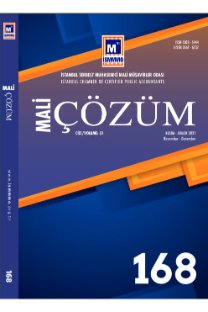MUHASEBE EĞİTİMİNİN PERSONEL İSTİHDAMINDA MESLEK MENSUPLARININ BEKLENTİLERİNİ KARŞILAMA DÜZEYİ: MERSİN ÖRNEĞİ
THE LEVEL OF SATISFYING BY ACCOUNTANTS DEMANDS IN PERSONNEL EMPLOYMENT OF ACCOUNTING EDUCATION: MERSİN CASE
___
- Byrne, M., ve Flood, B. (2005). A study of accounting students’ motives, expectations and preparedness for higher education. Journal of Further and Higher Education, 29(2), 111-124.
- Çürük, T. ve Doğan, Z. (2001). Muhasebe eğitiminin işletmelerin taleplerini karşılama düzeyi: Türkiye örneği. ODTÜ Gelişme Dergisi, 28 (3-4), s. 281- 310.
- Çürük, T., ve Doğan, Z. (2002). Muhasebe ders ve içeriklerinin verilme düzeyleri konusunda işletmelerin üniversitelerden taleplerinin tespitine ilişkin bir araştırma. Dokuz Eylül Üniversitesi İİBF Dergisi, 17(1), 107-126.
- Daştan, A. (2009). Karadeniz teknik üniversitesi İİBF ölçeğinde akademik görünüm ve muhasebe eğitiminin değerlendirilmesine yönelik bir araştırma. Muhasebe ve Finansman Dergisi, (42), 144-156.
- Gümüşoğlu, Ş., Serpil, Ü. ve Kestane Ö. (2010), Meslek yüksekokullarında eğitimin kalitesini artırmaya yönelik çabalar ve öğrenci gözüyle öğretim elemanlarının değerlendirilmesi İzmir meslek yüksekokulu örneği. TÜBAV Bilim Dergisi, 3 (2): 201-214.
- Kelly, M., Davey, H., ve Haigh, N. (1999). Contemporary accounting education and society. Accounting Education, 8(4), 321-340.
- Korukoğlu, A. (2003). Üniversite öğrencilerinin eğitimden beklentileri Ege Üniversitesi İİBF örneği. Süleyman Demirel Üniversitesi İktisadi ve İdari Bilimler Fakültesi Dergisi, 8(1).
- Korukoğlu, A. (1998). İşletmelerde muhasebe eğitimi ve üniversitelerle işbirliği. Dokuz Eylül Üniversitesi İktisadi ve İdari Bilimler Fakültesi Dergisi, 13(2).
- Pan, G., ve Seow, P. S. (2016). Preparing accounting graduates for digital revolution: A critical review of information technology competencies and skills development. Journal of Education for Business, 91(3), 166-175.
- Reyneke, Y., ve Shuttleworth, C. C. (2018). Accounting education in an open distance learning environment: case studies for pervasive skills enhancement. Turkish Online Journal of Distance Education, 19(3), 140-155.
- Şengel, S. (2011).Türkiye’de muhasebe meslek elemanı talebi üzerine bir araştırma. Muhasebe ve Finansman Dergisi, 50, 167-180.
- ISSN: 1303-5444
- Yayın Aralığı: Yılda 6 Sayı
- Başlangıç: 1991
- Yayıncı: İstanbul Serbest Muhasebeci Mali Müşavirler Odası
VERGİ VE MUHASEBE AÇISINDAN PAYLAŞIM EKONOMİSİ
MALİ ÇÖZÜM DERGİSİNDE YAYINLANAN MAKALELERİN BİBLİYOMETRİK ANALİZİ
KÜRESELLEŞME İLE KAMU BÜYÜKLÜĞÜ ARASINDAKİ NEDENSELLİK İLİŞKİSİ: OECD ÜLKELERİ ÖRNEĞİ
KONKORDATO ANLAŞMASININ DEĞERSİZ, ŞÜPHELİ VE VAZGEÇİLEN ALACAKLAR BAKIMINDAN DEĞERLENDİRİLMESİ
ENTEGRE RAPORLAMA İÇERİK ÖĞELERİ İLE KURUMSAL YÖNETİM İLKELERİ ARASINDAKİ İLİŞKİ, TÜRKİYE ÖRNEĞİ
TÜRKİYE’DE KRİPTO PARANIN VERGİLENDİRİLMESİ VE MUHASEBELEŞTİRİLMESİ
KURUMSAL YÖNETİM & VERGİDEN KAÇINMA İLİŞKİSİ: BİST İŞLETMELERİ ÜZERİNE BİR İNCELEME
Duygu Şengül ÇELİKAY, Fatma Münevver YILANCI
KAPSAMLI GELİRİN DEĞER İLİŞKİSİNE YÖNELİK ULUSLARARASI LİTERATÜR TARAMASI
SERMAYEDE VUKUA GELEN EKSİLMELERİN TİCARİ KAZANÇLAR AÇISINDAN DEĞERLENDİRİLMESİ
